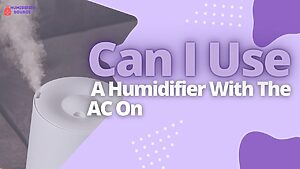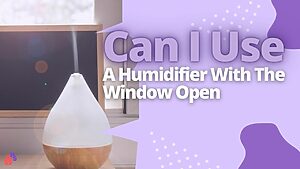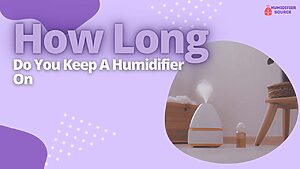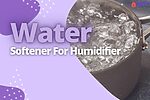Reverse osmosis water has many benefits that make it ideal for humidifiers. However, before making a decision, you should be aware of some potential drawbacks to using reverse osmosis water in humidifiers.
I have personally used reverse osmosis water in my humidifier for many weeks and can attest to its benefits. In this blog post, I will share everything you need to know about using reverse osmosis water in humidifiers, including the pros and cons.
So, if you’re wondering whether or not reverse osmosis water is good for humidifiers, read on for everything you need to know.
Key Takeaway’s
- Reverse osmosis water is filtered water that has had all of its impurities removed.
- Reverse osmosis water is good for humidifiers because it will not leave any mineral deposits behind.
- Reverse osmosis water is also good for people with respiratory problems because it will not aggravate their condition.
- Reverse osmosis water is more expensive than regular tap water but it is worth the price.
- Overall, reverse osmosis water is the best type of water to use in a humidifier.
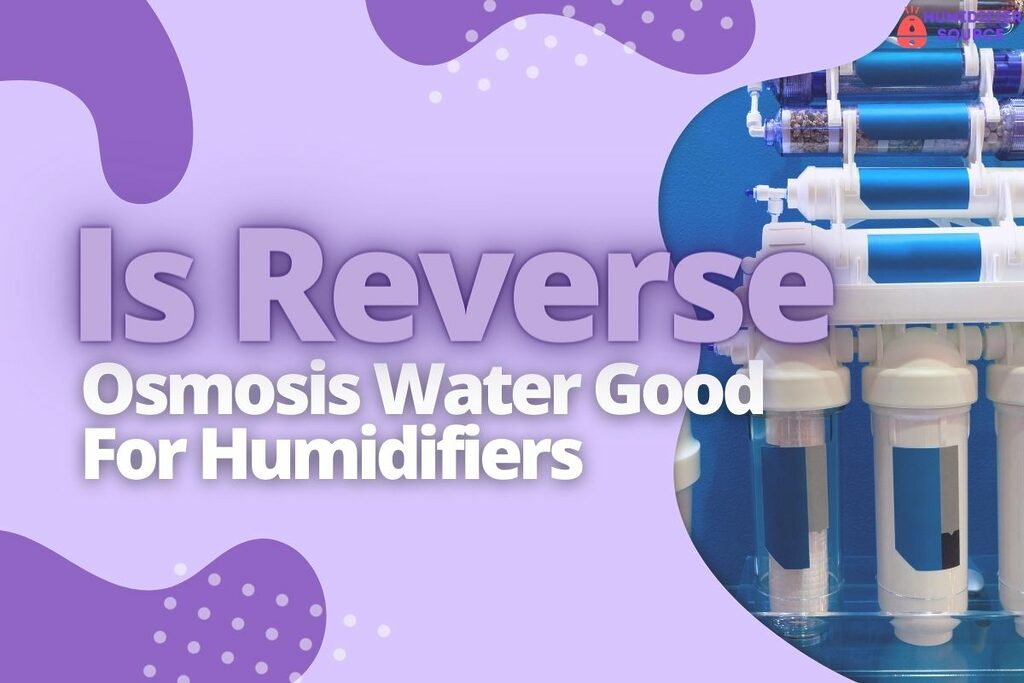
Here’s The Answer To Is Reverse Osmosis Water Good For Humidifiers
If you’re considering using a reverse osmosis system to treat the water for your humidifier, you should know a few things.
Reverse osmosis systems remove dissolved minerals and impurities from water by forcing it through a semipermeable membrane. This results in water with fewer dissolved solids, which can reduce scaling and buildup in your humidifier’s tank.
Additionally, because reverse osmosis systems remove dissolved minerals, they can also improve the quality of the mist produced by your humidifier.
However, employing a reverse osmosis system to purify water for your humidifier also has some possible negatives. One is that removing dissolved minerals from water can also remove magnesium, which is necessary for the proper functioning of many humidifiers.
Additionally, reverse osmosis systems can be costly and may not be necessary if you have access to high-quality tap water.
While the mist produced by a humidifier treated with reverse osmosis water may be less likely to cause allergic reactions, it may also lack the warmth and humidity of other humidifiers.
Reverse Osmosis In Humidifier Can Remove A Wide Range Of Impurities
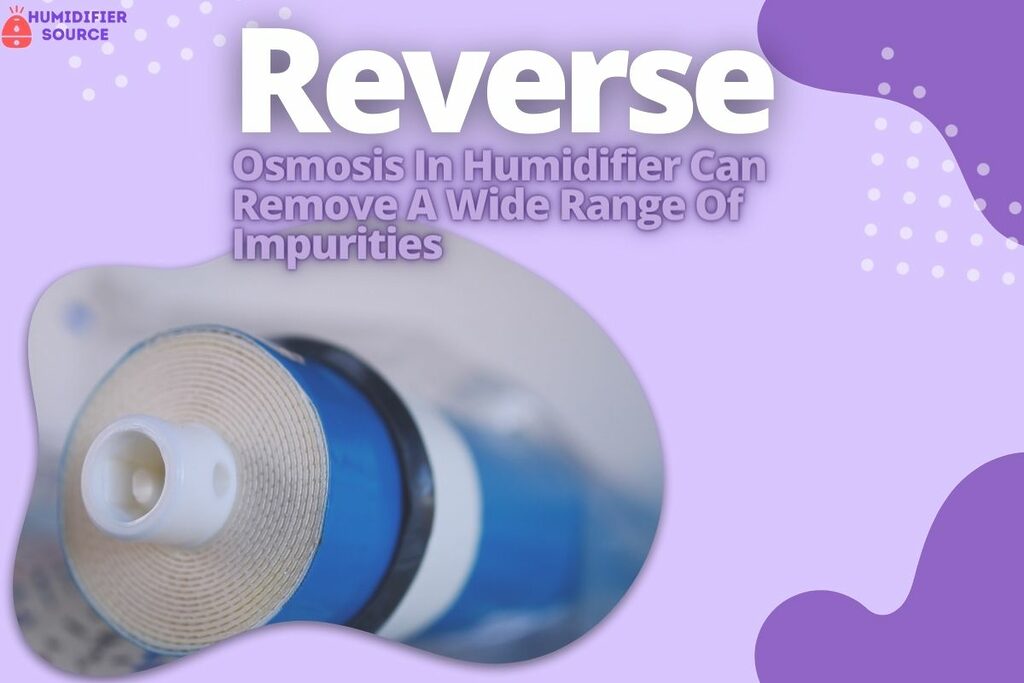
Reverse osmosis water can remove a wide range of impurities from the water. This includes dissolved salts, bacteria, and viruses.
RO water is good for humidifiers because it doesn’t introduce any impurities into the air that could potentially cause respiratory problems or other health problems to those who use these appliances.
For example, let’s look at reverse osmosis filtration: It takes dirty water and spins it through a semipermeable membrane with microscopic pores.
Only clean water molecules pass through these pores. At the same time, anything else is left behind on the other side of the membrane — whether it be minerals or harmful pathogens like E-coli or salmonella.
Reverse Osmosis Filtered Water Can Be Used In Humidifiers Without Worry Of Introducing Impurities Into The Air
Reverse Osmosis (RO) filtration is a method for purifying water by forcing it through a membrane that blocks large contaminants but allows water molecules to pass through.
RO water is safe for use in humidifiers because the process of reverse osmosis prevents impurities from entering the air.
Because RO filters out everything from lead to chemicals such as chlorine, you can rest assured that your humidifier will be safe when used with filtered tap water.
This makes it an ideal choice for those who want pure air quality without any impurities getting in their way.
Removing Naturally Occurring Minerals Can Impact The Performance Of The Humidifier
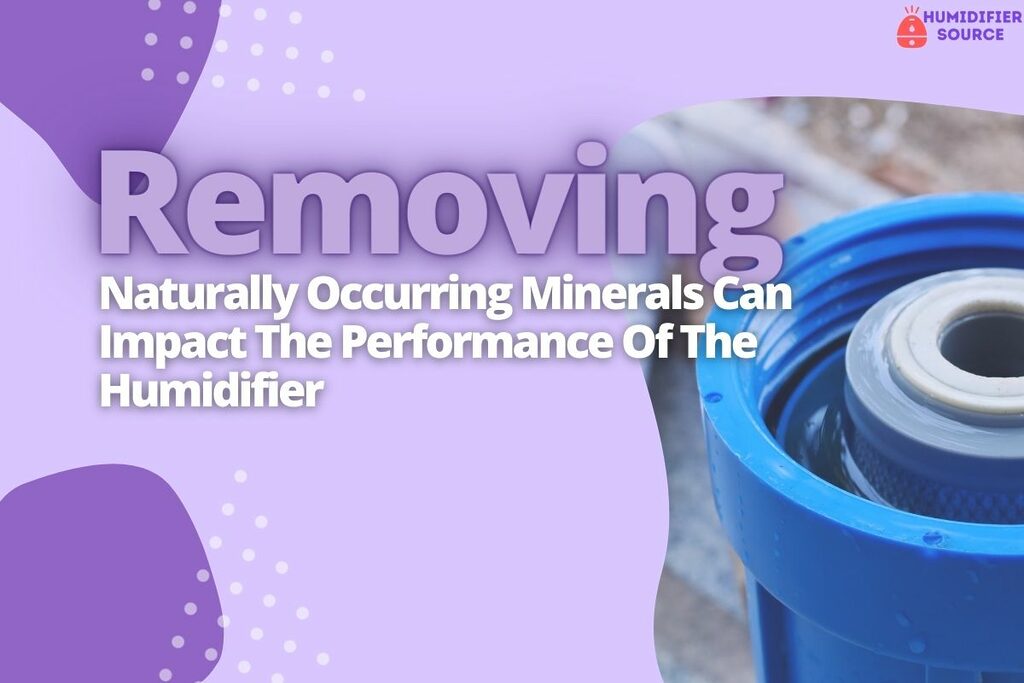
While reverse osmosis water is good for humidifiers, it is essential to note that the process removes some naturally occurring minerals from the water, which can impact the humidifier’s performance.
If you have a humidifier that runs on tap water or distilled water, then reverse osmosis (RO) water is a great option for you.
However, suppose your humidifier uses mineral cartridges to add minerals back into the air. In that case, it’s best to use distilled water solution to prevent mineral buildup in your system.
It Is Important To Use A Distilled Water Solution In Humidifier To Prevent Mineral Buildup
Reverse Osmosis water can be used in humidifiers, but it is essential to use a distilled water solution to prevent mineral buildup. Your humidifier’s heating element may accumulate minerals over time, reducing its efficiency.
The minerals also collect dust and debris that can cause clogs or other problems. You should only use distilled water solutions for your humidifier because the distillation process strips the water of any minerals that could build up inside of it.
Why Should You Use RO Water In Humidifiers?
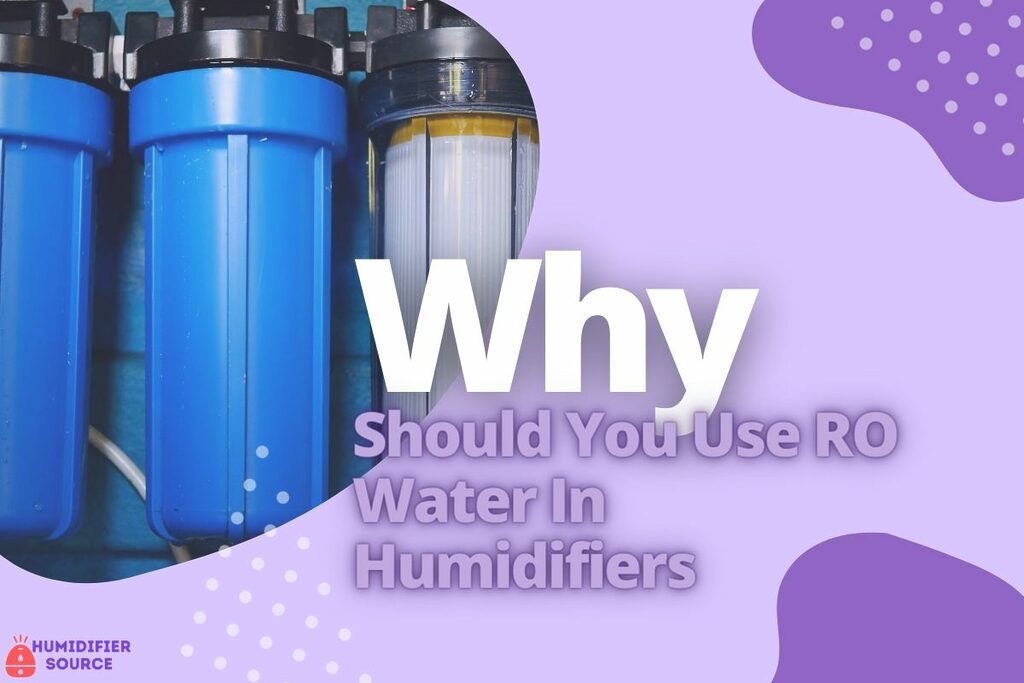
Reverse osmosis water is the solution if you want to raise the performance of your humidifier.
Reverse osmosis water is high-quality and can be used in humidifiers without the worry of introducing impurities into the air. It’s also readily available in many places; some even deliver it straight to your home.
The Benefits Of Using RO Water In Humidifier
Knowing that using RO water in humidifiers can have many benefits is essential.
- It will help you achieve great results in keeping your humidifier clean and sanitary.
- It removes all unwanted impurities such as dust particles, bacteria, viruses, etc. You can also use RO water to clean your humidifier’s accessories because the distilled water will not only clean them but also prevent damage caused by hard water minerals or residue from tap water.
- RO (reverse osmosis) water in humidifiers provides up to 100% pureness compared with other types of water available on the market today—which means no harmful chemicals are left behind after they go through the process of filtering out all those nasty stuff inside them.
How To Use RO Water In Humidifier
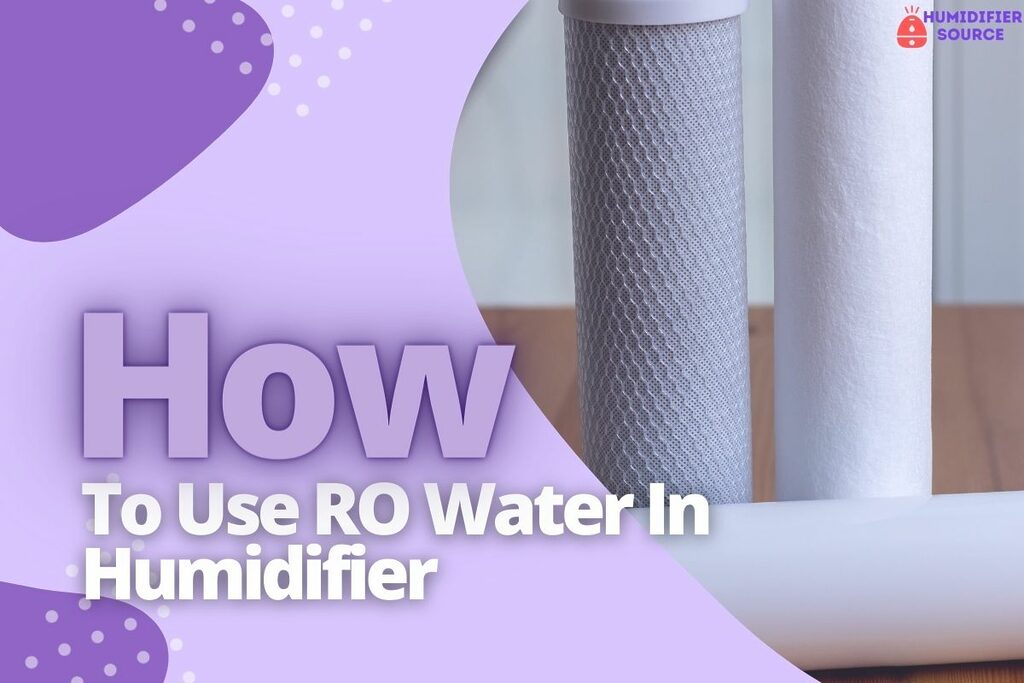
So you have a reverse osmosis unit and want to use it with your humidifier. What do you need to do?
Set up your humidifier according to the manufacturer’s instructions
- Fill your reservoir with regular tap water, not distilled or RO water: The minerals in the water will help maintain the right amount of humidity within your home.
- Turn on your humidifier and let it run for at least three hours before turning it off for an hour or two so that all of the minerals can settle out at the bottom (or use a timer)
- Drain out any remaining tap water from the reservoir and refill using distilled or reverse osmosis (RO) water
The Best Way To Get RO Water For Your Humidifier
You have a few options to get the best possible RO water for your humidifier. You can use distilled or mineral-free bottled water, but neither of these last long enough for daily use if you’re running a humidifier 24/7.
Using an ionizer to produce pure water from tap water is the next best option. This is similar to reverse osmosis, but it doesn’t remove all of the minerals from your water—so while it’s better than tap or bottled, it still won’t give you as pure a product as reverse osmosis.
If you plan on using RO water regularly and want maximum purity without having to worry about changing filters or refilling bottles every day—or if you’re concerned about getting sick because of bacteria in tap or bottled waters—this is the way to go.
Are There Any Drawbacks To Using RO Water In A Humidifier?
The main drawback to using RO water in a humidifier is that it can be expensive. RO systems are more expensive than distillers, requiring filters that need to be replaced periodically.
Another possible drawback with using RO water in your humidifier is that you might have difficulty finding it near you. While you may find distilled or mineral water in many locations, some areas don’t have convenient access to these products, making them less than ideal for humidifiers.
Furthermore, suppose you live in an area where the local tap water contains contaminants like pesticides or chemicals from industrial processes. Instead of buying and installing an additional filter on top of what is already present at home, you could choose a different filtration system in such a situation (or office).
Lastly—and most importantly—it should go without saying: use caution when handling any kind of distillation device. Numerous varieties are available, but none are completely safe under all circumstances because they involve boiling liquids into steam, creating hot temperatures capable of causing burns if touched improperly.
How To Get The Most Out Of Your Humidifier With RO Water
- If you have a humidifier, it is recommended that you use distilled water in the tank of your humidifier. Distilled water has no minerals or contaminants, which means it won’t leave any residue behind on your furniture or carpet when using it as steam. If you use non-distilled water in your humidifier, you could cause serious health problems. There will be residue left behind after using the steam function. Over time, this residue can cause damage to your furniture and carpeting.
- If possible, try to purchase a humidifier with an automatic shut-off feature so that when there isn’t any more room for moisture in its tank then, it will automatically shut off instead of continuing to run until all of its moisture has evaporated out into thin air (which would make no difference).
- The best way to clean out a dirty tank full of mineral deposits from reverse osmosis RO filters is by using an acid solution such as vinegar mixed with some baking soda since these two ingredients work well together at removing calcium carbonate buildup inside of pipes made from PVC plastic materials used within most residential homes today.
Conclusion
Reverse osmosis water is great for humidifiers because it helps prevent bacteria and mold growth. Additionally, reverse osmosis water can help improve your air quality by removing impurities from the water.
Reverse osmosis water is a fantastic alternative if you’re looking for a solution to increase your air quality.
If you have a humidifier, clean it as directed by the manufacturer and change the water frequently. By taking these simple steps, you can help ensure that your humidifier provides you with the best possible air quality.
Frequently Asked Questions
How do I know if my humidifier is working properly With reverse osmosis water?
Reverse osmosis water is pure and will not leave any deposits behind. Check the Humidistat to see if your humidifier is operating properly. A device that measures humidity levels. The Humidistat should be set between 30-50% depending on the manufacturer’s instructions.
Does reverse osmosis water prevent white dust from forming in a humidifier?
Reverse osmosis water can help to prevent the formation of white dust in your humidifier. Impurities typically cause white dust in the water, such as minerals. Reverse osmosis water can also help improve your air quality by removing impurities from the water.
How does reverse osmosis water compare to distilled water for use in humidifiers?
Both distilled water and reverse osmosis water are clean water that won’t leave any traces behind. However, reverse osmosis water is more effective at removing impurities from the water.
Is there anything I need to do differently when using reverse osmosis water in my humidifier?
You shouldn’t alter your humidifier’s settings if you use reverse osmosis water. Make sure to replace the water frequently and clean the appliance as directed by the manufacturer. Reverse osmosis water is a great option for those looking for a way to improve the quality of their air. Reverse osmosis water can help remove impurities from the water, improving your air quality. Be sure to change the water regularly.
Author
- The Right Way To Fill A Humidifier: Hot Or Cold Water?
- Humidifier And AC: Is It A Match Made In Heaven?
- Can I Use A Humidifier With The Window Open (Solve Your Dilemma)
- Perfect Air Quality: How Long To Run Your Humidifier
- Should You Have A Humidifier In Nursery (The Surprising Benefits)
- Humidifiers In Bedrooms: A Guide To Good Placement



